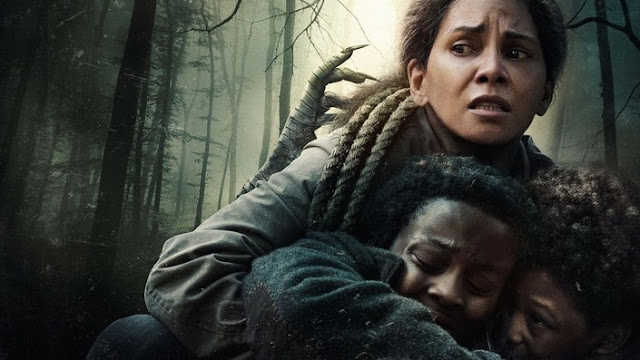I fully understood what this movie was going for, but was still underwhelmed.
Listen at the podcast providers of your choice.
Horror movies relationship with cabins in the woods is fascinating. On the one hand they're the go to location for slasher movies because the inherently isolated location separates all of the potential victims from help, even in the age of cellphones. Cut out transportation and everyone is in a world of trouble. Hence why the meta-commentary on horror movies took that enter premise Cabin in the Wooods as its name. On the other hand, cabins can be a refuge in survival horror situations where resources are scarce and highly populated areas are especially dangerous (see A Quiet Place). I bring all of this up because today's movie Never Let Go, demonstrates a bit of both.
The Setup
The film centers around a family unit of three, Momma and her two sons Nolan and Samuel, who live an isolated existence in the woods to keep them away from "the Evil." But as a particularly difficult winter shaves down the family resources faster than expected, Nolan begins to question whether the evil Momma describe is real or imagined.
Never Let Go is a frustrating movie. Not because it's outright bad, but because it could've been a lot better.
Something I've observed before, and really like about movies like this, is how the parent functions a lot like a small scale cult leader. They've constructed a reality that the children inherently accept, because they grew up in it and function as protector, but also a potential threat (i.e. if you break the rules you're likely going to have some kind of penance). But questioning that authority is fraught either way. Because either your parent is right and the world really is out to get you. Or you're wrong and your parent, and only support you've ever known, is dangerous and unstable.
Seeing all of this from the boy's perspective, where they are told about dangerous things, that they can't see while their mom can, doesn't make it feel any less real in the moment.
And director Alexandre Aja has enough horror movies with aggressive animals (see Crawl) to tease out the tension and make something as simple as a trip, a loose rope, or another minor inconvenience feel tense.
So where does this movie trip up?
In my opinion it's all around the movie-long metaphor.
It's pretty clear to me, that Never Let Go is meant as a metaphorical reflection on generational trauma and possibly mental illness.
This is bolstered by Momma talking about how she learned about "the Evil" from her mother, and how said evil has infected almost everyone in her life including her former husband, her father and even her mother. Momma is also visited by visions of her dead loved ones that keep telling her that someday she is going to kill her boys.
Likewise, we've got strong imagery associated with staying in Momma's worldview (in this case a rope that the boys are told to keep tied to their waists if they ever leave the house) and the evil being represented by a snake (both a biblical image of temptation and also a predator known for squeezing the life out of its prey).
By itself, that all works. Narratively, the movie seems to pick and choose how "the Evil" works to move the plot forward. This is a tricky element that occurs with every "is this real or is this fake" kind of horror movie. How do you create escalating tension when you want to keep the possibility of a reality rug pull available?
Buuuut, because this movie is about generational trauma and mental illness, Momma can't be right. If she's right that validates her entire worldview, which is clearly an unwell means of control, even though it's meant as an act of love.
So when we've got extended sequences where one of the boys is encountering a manifestation of the Evil in the woods, it's tense...but also not because we kind of already know this is a metaphor.
Which is a shame because our cast of three of Halle Berry and Percy Daggs and Anthony Jenkins inhabit these characters so well. I related a lot to Percy, who is constantly pushing to determine whether or not what he's been told is correct while Jenkins wants stability and views his mother as said stability. Many of this movie's best scenes involve tense conversations between the two boys about what is or isn't real, which is heavy lifting for two young actors to pull off, and they succeed mightily.
And Berry has always been good at playing characters on the verge of a some kind of breakdown. As much as she's been cast as a sexpot female lead, her best roles always contain a bit of edge and Momma is volatile as hell. She's genuinely scary when she gets concerned her boys are "infected" and you can see why Nolan questions her and why Samuel obeys.
This combination of a great cast, great premise and a solid director is what makes the resulting movie so frustrating. Because everything about this movie is primed for something if not profound, at least emotionally impactful. But what it really feels like is a series of tricks to keep the audience on edge.
That's how I ended up fully understanding what the movie was going for, while also being underwhelmed.

No comments:
Post a Comment